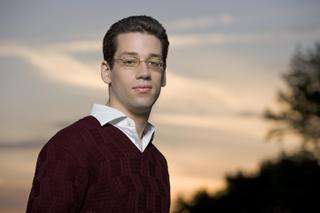|
Back
The Poet Speaks New York
Zankel Hall, Carnegie Hall
03/12/2013 - & March 6 (Philadelphia), 8 (Kansas City), 10 (Orono), 2013
Robert Schumann: Fantasiestücke, opus 12 – Davidsbündlertänze, opus 6
Leos Janácek: Selections from On The Overgrown Path, Book I
Wolfgang Amadeus Mozart: Minuet in D Major, K. 355 – Adagio in B Minor, K. 540
Jonathan Biss (Pianist) 
J. Biss (© J. Katz/EMI Classics)
When Jonathan Biss made his Carnegie Hall debut two years ago, the program featured music by Janácek and Schumann. At his stunning recital last night in Carnegie Hall, he also featured Janácek and Schumann.
Without meaning to be presumptuous, methinks he has a certain liking for Janácek and Schumann.
Last night, though, it wasn’t so much a liking as a marriage. For movements of the original Schumann Fantasiestücke were interspersed with music by Janácek’s first book of On The Overgrown Path, with good motivations behind the conception. Both composers used everyday occurrences (a falling leaf, a whim, a farewell, an evening) to create vignettes. Both composers eschewed ordinary piano forms, if necessary, to present more immediate emotions. Both composers used a language so utterly personal that the two, of slightly different generations (Janácek was two when Schumann died) could have been speaking to each other.
That, however, was hardly why the combination worked. It worked because Jonathan Biss has Gieseking-like poetry behind his fingers. His sensitivity needed no extra pauses or declarations, no exaggeration, no echoey pedals. Mr. Biss, simply put, has an innate grace, an innate poetry, and that was expressed from the first notes to the last pianissimo C-Major chord at the very bottom of the piano in another Schumann, the Davidsbündlertänze.
Even if he hadn’t interlaced the Schumann Fantasy Pieces with the Janácek, it would have been a special concert. Mr. Biss could contrast the latter’s mystical evening with Schumann’s more jumpy upsetting Abend, yet he still preserved the poetry of the piano. The sudden outbursts in Janácek’s music weren’t so much momentary hysteria, the way they are frequently played, as measures of elation too joyous for the ordinary bonds of a musical measure.
And when he played the final benison of Schumann’s “End of the Song”, one felt that Mr. Biss had surveyed a landscape in the company of Keats and Byron, both mystical and emotionally exciting. But the comments were those of poetry.
After the intermission, I had to glance at my program when Mr. Biss began playing two short Mozart pieces. They were beautiful but the emphasis on dissonances was almost disconcerting. Nothing was “classical” or pure in this Mozart, the notes were held back but almost fierce in their sounds.
Thus, seriously presumptuously, I hypothesized that, had Mozart liven another 30 years, he wouldn’t have transformed himself into a 19th Century Romantic, like a tadpole into a frog. He would have taken a more original direction, a direction looking backward into Monteverdi-style dissonance, looking forward into more daring subconscious conflicts. By allowing another side of Mozart to be heard, Mr. Biss, to this listner, could fantasize how that would have evolved. (Damn those stupid doctors who didn’t know how seriously ill Mozart was!!!)
The final Davidsbündlertänze was early Schumann but hardly inferior Schumann. In fact, the joy and pain which he wanted to be attached to each work were subjugated to Mr. Biss’s marvelous playing. These were not “dances” of the title, but whimsical thoughts, tiny nightmares, pieces that tripped over each other telling stories, and, with the pianist’s immense artistry, relating those dark and spirited ideas which tumbled out of the composer’s most secret soul.
Harry Rolnick
|